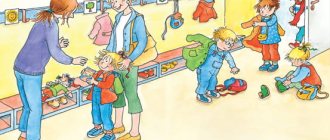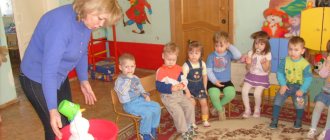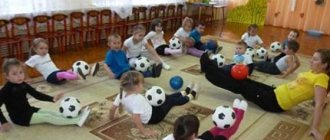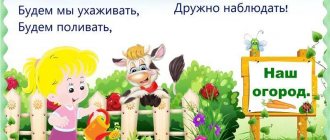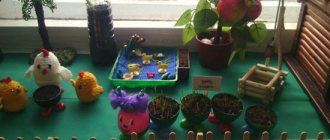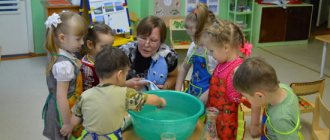Methodological piggy bank for projects
So, dear friends, let's get acquainted with the literature before moving on to a variety of topics.
Together we will look through the pages on the website www.kniga.ru and find a lot of interesting things for our project. An interesting methodological program awaits you. Books, games, projects for preschoolers can be found here.
Another no less interesting site is www.uchmag.ru, where you will find the organization of project activities for children, which is the main requirement for the Federal State Educational Standard. It ensures interaction between parents and teachers in raising children. The program can be installed via the Internet.
On the most interesting website UchMag from the series “To help preschool teachers” you can purchase project notes and organization of design for preschoolers.
Didactic, plot-based, outdoor games are aimed at the personal formation of the child and the development of his creative, mental and social processes. By visiting the methodological site, you, teachers, educators and parents will find comprehensive thematic projects that present entertaining and interesting games with sayings, riddles, stories and poems.
Game projects
Topics on hygiene skills in children
We got acquainted with the literature, now I propose to consider interesting topics. The preschool organization is characterized by interesting and research work in the profession of educators and teachers.
Dear educators and parents, you, of course, want your kids to grow up neat, smart, kind, sympathetic, and you also want to develop cultural and hygienic skills in your kids, don’t you? First, I will propose two projects: the theme of little tidies and the theme of clean hands. The implementation time for the first gaming project is 2-3 weeks, and the second educational, gaming and short-term project is 1 week. Their tasks are:
* proper use of soap;
* careful washing of hands and face;
* wiping dry with a towel after washing;
* use of a comb and handkerchief;
* learning to follow appearance;
* formation of basic table behavior skills: correct use of a spoon, use of a napkin, chewing food with a closed mouth, silence at the table.
First explain all this to the children when playing with dolls: teach them to wipe their mouths, wash the doll’s face and hands, and take care of its clothes. As a result of this project, children themselves will learn to eat carefully, hold a spoon and use a napkin correctly.
This project will also help them dry their face, hands with their towel and then hang it in their place. Children will begin to use handkerchiefs correctly. Personal hygiene will become a natural thing for them. Or you can go on a sea voyage and learn a lot of interesting things.
Bright holiday Easter
The relevance of impressions received in childhood will remain in the memory for a long time. Therefore, it is necessary to introduce children to the history of our Motherland, its culture and its holidays from early childhood. Therefore, the project for the bright holiday of Easter will be a great theme for kids. The purpose of this project is to familiarize children with the Easter holiday, with rituals, customs and its history. It is an informational and creative short-term project and lasts 2 weeks. At the first preparatory stage, the following are compiled:
- long-term action plan;
- recommendations for introducing children to Orthodox culture;
- materials for classes, conversations, illustrations;
- questions with parents related to the topic.
At the second stage, practical classes are conducted:
- with cognitive development: computer presentations “Ryaba Hen”, “Easter Kolobok”;
- with didactic games;
- fiction: Easter stories, conversations;
- artistic creativity: modeling, drawing;
- music with bells, Easter music from a box.
At the third and final stage, exhibitions of interesting crafts by children and parents are organized, as well as participation in a district competition on this topic, as well as work with parents and children’s creativity with them, for example, making Easter eggs.
Project "Poteshki"
The formation and development of children’s speech plays an important role in the child’s personal formation. Nursery rhymes play an important role in the development of children. By listening to simple rhymes, repeated words, exclamations and emotional appeals, children learn to listen and repeat words.
Sound combinations that are repeated create a musical effect with the help of which the pronunciation of sounds and speech hearing of babies develops. Therefore, the Nursery rhymes project will be very useful for young children. It is long-term (1st junior – 2nd junior group)/
The goals of this project are:
- creating positive emotions;
- development of children's speech skills, as well as imagination, thinking and memory.
The objectives are:
- teaching children to listen to short nursery rhymes;
- repetition of words and phrases after the teacher;
- development of monologue and dialogue in children;
- development of fine motor skills in children;
- education of speech culture of sound.
Methods and techniques for implementation are:
- reading nursery rhymes with demonstration of paintings;
- conversations on the meaning of nursery rhymes;
- playing out the plot of nursery rhymes.
As a result, with the targeted and systematic use of nursery rhymes, children master their native language, modeling, drawing, physical and musical development, as well as initial hygiene and self-care skills.
Environmental education of children
Equally important is the upbringing of children related to the protection of the environment. Currently, a loving and caring attitude towards nature is very important for every person. Therefore, it is necessary to introduce children to it from a young age. I hope you agree with me, dear readers.
Therefore, for better implementation of the tasks of environmental activities, project activities on this topic are carried out.
So, let’s start working with the children on the topic: “Let’s feed the birds.” An interesting topic that will foster a caring attitude towards living nature. This is an informational and creative game short-term project for two weeks. The objectives of this project are:
- introducing children to birds;
- learning to answer questions in a short sentence;
- enriching vocabulary on the topic;
- fostering a caring attitude towards birds.
The project can be implemented using:
- jointly writing a story about feeding the birds;
- outdoor game: “Car and sparrows”;
- bird watching;
- memorizing a poem about a bird;
- unconventional drawing technique;
- didactic games, for example “Who lives in the house”;
- working with parents: making feeders.
As a result, children will become acquainted with birds, distinguish them, and learn to imitate bird voices. Children will develop compassion, responsiveness, and goodwill.
You can also introduce children to the project “Objects of Inanimate Nature” and develop children’s knowledge about the physical properties of the external environment, introduce them to viscosity, flowability, buoyancy, solubility of substances, as well as the sun, air, earth, water as environmental factors. This project will last two weeks.
Long-term project in the 1st junior group “Rhymes for Kids”
Project duration: 09.2020 - 06.2021
Project participants: children, parents and teachers of the 1st junior group.
“The task of an adult is to reveal to a child the miracle that a book contains.”
A nursery rhyme is a small genre of oral folk art, a song-sentence directly related to a gesture.
Relevance. At a young preschool age, nursery rhymes play a special role, and the unique uniqueness of the sound speech flow is especially valuable. Simple rhyme, emotional coloring, sound combinations and their melodiousness create the effect of musicality. Therefore, a nursery rhyme, first of all, serves as an assistant in developing the sound culture of speech. Speech hearing and pronunciation of sounds also develop. The nursery rhyme contains many bright and colorful word pictures, which allows you to learn new forms of words denoting objects. Reading nursery rhymes occurs with many repetitions, which helps memorize words and then use them. The content of many nursery rhymes is rich in verbs. And as a result, the child’s vocabulary is enriched. Along with this, the formation of the grammatical structure of speech and the development of monologue and dialogic speech occur. During the period of early preschool age, nursery rhymes are the most understandable, interesting, musical and educational means for a child, which make it possible to lay a solid foundation for the psychophysical development of a child in the preschool period of childhood.
Recently, we often hear the statement “people have stopped reading.” From conversations and observations of communication between parents and children, it can be assumed that modern parents really communicate little and read books to their children, due to their employment or dependence on modern media (Internet , TV, all kinds of gadgets).
To clarify, we invited parents to answer the “Child and Book” questionnaire as part of Children’s Book Week. From the results of the survey, it is clear: all parents who took part in the survey read books to their children (100%), which is very gratifying. 60% read to children several times a week, 30% daily, and 10% rarely. Half of the parents read at the child’s request, and the other half both at the child’s request and on their own initiative. All respondents have books at home: there are poems and fairy tales, nursery rhymes, and additionally encyclopedias. Half of the parents surveyed said that at home their children talk about what they read in kindergarten. It is gratifying that all parents read various literature: fiction, educational, periodicals, which is very pleasing. From the analysis of the questionnaires, we concluded that parents are involved in the development of their children, but for this they do not have enough time and ideas about the benefits of folklore (nursery rhymes) and memorizing short works for children of primary preschool age.
Folklore is one of the most effective and vibrant means, fraught with enormous didactic opportunities. Acquaintance with folk works enriches children's feelings and speech, shapes their attitude towards the world around them, and plays an invaluable role in all-round development. Children's folklore is a vast area of oral folk poetry. This is a whole world - bright, joyful, filled with vitality and beauty.
Taking into account the relevance of this issue, I developed the project “Rhymes for Kids”, the goal of which was to form an emotionally positive attitude towards the book through folklore.
Project objectives:
- Development of children's speech, enrichment and activation of vocabulary.
- Cultivating a caring attitude towards books.
- Formation of the need for reading.
- Increasing the level of development of speech activity.
- Acquaintance with the surrounding natural world, with the way of life and way of life of the Russian people.
- Involving parents in creating conditions for developing children's interest in books at home and in kindergarten.
Expected results of the project:
- There is an emotional responsiveness of children to the listened works of folklore.
- The range of children's reading has been expanded.
- The child's vocabulary has been enriched.
- The need to read a book is formed.
- Parents were active in creating conditions for the development of children's interest in books.
Project product:
creating a card index “Rhymes for Kids”
- creating a book “Our Favorite Nursery Rhymes” together with parents, followed by viewing at a parent meeting. Creation of a lapbook “Reading to Children”, a children’s book “Rhymes, Songs”.
Working with parents
Questionnaire “Child and Book” (Appendix 1)
- Conversation “The role of nursery rhymes in the development of young children” (Appendix 2)
- Book exhibition “Reading with Children”
- Folder “How and what to read to children 2-3 years old”
- Booklet “Reading to Children”
Construction of work taking into account the following principles: clarity, consistency, activity, continuity with the family, variability. Methods: verbal conversations, storytelling, reading fiction, listening to audio recordings, looking at books, illustrations, albums, didactic games, showing theatrical performances, participating in leisure, entertainment, and holidays.
Literature:
- Batyaeva S.V., Savostyanova E.V. Album on speech development for the little ones. M.: ZAO ROSMEN-PRESS, 2010. 88 p.
- Vinnikova G.I. Classes for children 2-3 years old: development of speech, fiction, visual arts. Sphere shopping center, 2009. 128 p.
- Caramel" for kids (songs, nursery rhymes, fairy tales, poems). M.: Omega, 2007.
Contents of self-education work for the 2020-2021 academic year
September. Selection of material necessary for working with children and parents on the topic “Development of speech in young children through folklore.” Studying the topic, setting goals and objectives on this topic. Planning.
October. Learning and reciting nursery rhymes with children in everyday life. Questioning of parents on the topic: “The child and the book”, parent meeting “The role of nursery rhymes in raising a child.”
November. Studying the topic “Printed board games based on Russian folk tales.” Joint and independent examination of illustrations and pictures. Creation of creative works “My Favorite Fairy Tale” together with parents. Decorating a book corner on the theme “Rhyme Songs”.
December. Decoration of the “Our Creativity” corner. Studying the topic “Theatrical games as a means of developing children’s speech.” Enrichment of the dressing area. Learning poems and songs for the New Year, theatrical performance “Gifts of Santa Claus.” Finger games on the theme “winter”.
January. Decorating a theatrical corner in a group, making a theater based on Russian folk tales. Studying the topic: “Use of folklore in working with children.” Watching the presentations “Such different nursery rhymes” with children.
February. Studying the topic: “Use of folklore in working with children.” Joint and independent examination of illustrations and pictures. Using nursery rhymes while washing, dressing, undressing, and preparing for bed. Consultation for parents “The role of folklore in the development of children.”
March. Getting to know nursery rhymes and poems about mom. Entertainment “Sunny, like mom.” Consultation “Speech and fingers”. Participation in the general holiday “Farewell to Maslenitsa”, didactic games “Find out which nursery rhyme is an excerpt from”, “Find out the nursery rhyme”.
April. Studying the topic “introduction to chants, nursery rhymes about the sun.” Entertainment "Little suns - helpers of the big sun." Creating a card index of nursery rhymes. Creation of the book “Favorite Nursery Rhymes” together with parents.
May. Consultation for parents “How to learn poetry correctly.” Parent meeting “Our successes”. Replenishment of the development environment: lacing games, sports corner. Learning nursery rhymes about animals. Entertainment “Forest animals visiting children.” Quiz game "Fairy-tale heroes".
Self-analysis of the self-education plan. Presentation of the project “Development of children’s speech through folklore.”
Expected result
By the end of the year, the children's vocabulary was enriched with new words, phrases, and expressions. The pronunciation of sounds became clearer and more expressive. Primary skills in perceiving the phonemic and lexical aspects of speech have been formed.
An interest in oral folk art and fiction arose.
Parents develop an interest and understanding of the need to use small forms of folklore in speech development.
The development environment of the group in this direction has been enriched.
The children remembered a lot of nursery rhymes, songs, and Russian folk tales.
Memory and attention have improved.
We draw nursery rhymes: NOD “The sun is shining...”
Other events
There are also other informational and creative game projects, such as “Cat”, the purpose of which is to familiarize yourself with a domestic animal, in this case a cat, with its characteristics, habits, appearance, as well as fostering a caring attitude towards animals.
It will be interesting to show children the game project “Cat House” on video:
Another information and creative project is “Vitamins”. This topic studies the issues of maintaining health in children. Here ideas are given about vitamins, their importance for health, and proper nutrition. This project lasts 3 weeks.
“My Family” is the name of a creative long-term project. Its purpose is to provide an initial introduction to the family. The objectives are to evoke positive emotions about the family, develop expressions of tenderness, joy, and cultivate respect for parents. I suggest watching a video on this topic with your little friends:
Since preschoolers love to explore everything and put it into practice, there is such an educational, research, group event “The Magic Drop”, the purpose of which is to consolidate existing knowledge about water. The objectives are to familiarize children with the properties of water, support children’s initiative, ingenuity and encourage friendships during the period of research. The project lasts 2 weeks. It's short-term.
Also interesting is the event, the work plan for the master class, which offers creative tasks for parents, organizing competitions, participating in project activities, aimed at developing the children’s abilities and promoting trusting relationships between the family and the kindergarten.
So, to summarize, I come to the conclusion that interesting topics in kindergartens will help develop the intellectual and physical development of children. Therefore, together, dear teachers, educators, and parents, let us make every effort to ensure that our children grow up healthy.
I hope that with this article I helped you make action plans in kindergartens and other preschool institutions. I say goodbye to you, but not for long. Stay tuned for other interesting and informative articles. And if you have questions, be sure to ask. I will be happy to answer them. Share this article with your friends, and by subscribing to my blog updates, you will learn a lot of interesting things.
Sincerely, Tatyana Sukhikh! Till tomorrow!
By the way, I recommend reading:
Project “Continuity. Nursery - garden"
Project “Continuity.
Nursery – garden” Germogenova E.V., deputy. dir. in Educational Management Gymnasium No. 56, St. Petersburg, teacher - psychologist; Grigorieva I.P., head of GBDOU No. 92 of the Petrograd district, St. Petersburg The entire further path to knowledge depends on how the child feels when climbing the first step of the ladder of knowledge, V. A. Sukhomlinsky .
One of the primary tasks of a manager is to organize the process of adaptation to new conditions for all participants in the process. Each new period in a person’s life is accompanied by new difficulties and experiences. Children experience such difficulties especially acutely. For a child who is used to playing at home, the situation of entering a kindergarten, in our case a nursery or junior group of a kindergarten, is not an easy one. The situation of entering kindergarten is not easy for parents either. That is why the main work on the successful adaptation of a child to new conditions is carried out with parents. Some people come to kindergarten without any problems, while for others the problem of adaptation remains relevant. To most effectively solve these problems, specialists from the Preschool Department of Gymnasium No. 56 and specialists from GBDOU No. 92 developed the project “Continuity. Nursery - garden"
Objective of the project
: preventing and overcoming difficulties in entering kindergarten and during the transition from nursery and junior groups to secondary education in another preschool educational institution, maintaining the health and emotional well-being of pupils.
Project objectives:
1. Provide students with emotional comfort in new conditions.
2. Help educators find the right ways and means of working with students adapting to new conditions. 3. Develop ways to correct problems of maladjustment. 4. Inform parents about the problems of adaptation of children and the characteristics of a particular age period. Provide psychological assistance and support. 5. Increase the level of professional competence of educators and the pedagogical competence of parents. Continuity
is
a connection between phenomena in the process of development, when the new, replacing the old, retains some of its elements
. (Big Encyclopedic Dictionary, St. Petersburg, 1999)
The implementation of continuity helps to develop unified approaches to training and education and ensures the preservation of existing traditions. Failure to comply with the rule of continuity in the general system of didactic principles of education and upbringing often becomes the cause of maladaptation
, and, consequently,
deterioration in the health of the pupil and teacher.
The project involves the interaction of employees of preschool educational institutions (directors, methodologists, educators, psychologists). The project is based on the basic principles of humanistic psychology and pedagogy and is focused on close interaction between all participants in the educational process. The project contains a system of informing all participants in the educational process in the form of booklets
: ·For educators ·For parents.
Who carries out the succession? Continuity in the education, upbringing, and development of the child is carried out by: · kindergarten teachers; · specialists; · parents.
There is no point in talking about the psychological characteristics of early and early preschool age, since we have colleagues who are not only theoretically, but also practically familiar with them. Teachers who work in nurseries face a crisis period of three years. How to deal with it? How to help parents? And here interaction with colleagues comes to the rescue, and it does not matter at all what preschool institution these colleagues are from. Children attending nurseries come to kindergarten already more adapted than their peers who come to kindergarten for the first time.
We conducted a study to study what educators want to see as their future pupils who came from nursery and junior kindergarten groups.
Initially, we thought that teachers would talk about the development of attention, memory, and thinking (visual-figurative). But it turned out that teachers are most concerned about the level of speech development, self-care skills and socialization. Some pupils of GBDOU No. 92 end up in the Preschool Department of Gymnasium No. 56, and we observe a fairly high level of development of the pupils. The main thing is that the children we observe are emotionally well and ready to explore the world further with interest and desire. That is why we developed this project, a project of interaction, a project of friendship between two institutions. An important aspect is working with parents!
In GBDOU No. 92 this layer has been mastered, and parents are prepared when moving to a new level. The system of individual counseling before entering kindergarten, the work of the “Parents Club”, and information booklets help improve the pedagogical competence of parents. The competence of a parent is a complex individual psychological formation that arises on the basis of the integration of experience, theoretical knowledge, practical skills and significant personal qualities, which determines his readiness to implement the educational function (Kostyleva N.E.). The competence of a parent expresses “the unity of his theoretical and practical readiness to carry out parental activities.” As an integrative personality education, it is based on a number of competencies, manifested in knowledge and experience in a particular field. The set of competencies that ensure readiness to implement the educational function forms the basis of parental competence. To be a competent parent means to be able to mobilize existing educational competencies in the specific situation of raising your own child. Parental competence is based on key and related competencies (E.V. Bondarevskaya). Key competencies include those that have universal significance and can be used in various types of activities when solving many educational problems. Related – those that are additional, allowing in-depth solution of individual tasks of personal development, reflecting the individual interests and passions of parents, the individual capabilities of children.
The formation of parental competence is a complex and dynamic process, carried out both in the course of family self-education and with the direct assistance of teachers of educational institutions. That is why these project blocks were developed. Working with parents.
·First conversation.
·Information booklets. ·Parents' club "Support" on the basis of the Preschool Department of Gymnasium No. 56. ·Advisory support. ·Questionnaire “Adaptation”. This project reflects work with teachers and students. Work with teachers
· Consultations with specialists.
· Seminars “Adaptation”, “Difficult Child”, “Working with Parents”, “Transformation of the Game” (based on the Preschool Department of Gymnasium No. 56). ·Round tables and consultations. ·Information booklets. Work with students
·Individual and group joint activities according to FGT programs. ·Maintaining a “Pupil Diary”, hereinafter referred to as “Individual Support Card”. ·Monitoring the emotional well-being of pupils.
